In the Spring of 2023, The FruitGuys Community Fund awarded 18 small farms and agricultural nonprofits from 15 different states a total of $83,757 to implement sustainability projects spanning focus areas such as water conservation, energy efficiency, biodiversity, pollination, seed preservation, and ecological land management. The 2023 grantees are more than halfway through their project timelines and the majority have submitted interim updates sharing stories of the successes and challenges they’ve had so far in carrying out their plans.
Interim Project Updates
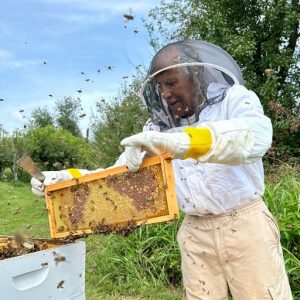 Ballew Estates LLC is a 27-acre, fifth-generation, multi-generational farm in Richmond, KY that grows fruit, berries, vegetables, herbs, and seeds. Farmer Jim Embry is a noted permaculture expert, Slow Food proponent, and was named a 2023 James Beard Foundation Leadership Award Winner. They received a $4,996 grant to purchase varieties of native pollinator plants, 50 packages of heirloom vegetable and culturally-relevant seeds, and three additional beehives and a bee nuc that will expand their honey production and the diversity and quantity of bees on the farm. So far they have prepared the area for bee hives, purchased and set up the hives, and brought in the new bee colonies. In addition, they’ve purchased a variety of seeds.
Ballew Estates LLC is a 27-acre, fifth-generation, multi-generational farm in Richmond, KY that grows fruit, berries, vegetables, herbs, and seeds. Farmer Jim Embry is a noted permaculture expert, Slow Food proponent, and was named a 2023 James Beard Foundation Leadership Award Winner. They received a $4,996 grant to purchase varieties of native pollinator plants, 50 packages of heirloom vegetable and culturally-relevant seeds, and three additional beehives and a bee nuc that will expand their honey production and the diversity and quantity of bees on the farm. So far they have prepared the area for bee hives, purchased and set up the hives, and brought in the new bee colonies. In addition, they’ve purchased a variety of seeds.
The “bees have acclimated to their new surroundings quite well, are making honey and increasing the brood,” said Farmer Jim Embry.
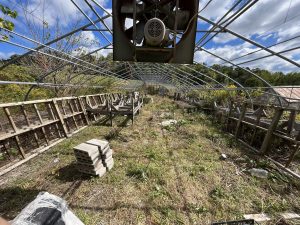 Beauty Blooms LLC is a 10-acre, woman-of-color-run farm in Damascus, MD that grows vegetables and flowers of primarily African heritage heirloom varieties. Founder and Farm Manager, Nia Nyamweya, is regenerating land that was previously in corn and soybean production for many years. They received a $5,000 grant award to purchase a high tunnel to extend their growing season and install a rainwater catchment and drip irrigation system. So far they were able to purchase a larger-than-anticipated 35′ x 96′ A-frame high tunnel from a local farmer. The high-tunnel has been successfully disassembled and transported to their farm, and they are now in the process of re-assembling it on their plot with some support from community members.
Beauty Blooms LLC is a 10-acre, woman-of-color-run farm in Damascus, MD that grows vegetables and flowers of primarily African heritage heirloom varieties. Founder and Farm Manager, Nia Nyamweya, is regenerating land that was previously in corn and soybean production for many years. They received a $5,000 grant award to purchase a high tunnel to extend their growing season and install a rainwater catchment and drip irrigation system. So far they were able to purchase a larger-than-anticipated 35′ x 96′ A-frame high tunnel from a local farmer. The high-tunnel has been successfully disassembled and transported to their farm, and they are now in the process of re-assembling it on their plot with some support from community members.
“By purchasing the larger structure, we have doubled our seed starting and season extension capacity that we originally anticipated in our grant proposal. The volume of food we provide to the community will be much larger throughout this fall/winter season. The food we produce in this high-tunnel will be provided to local food banks and organizations increasing food access for low-income consumers,” said Farmer Nia Nyamweya.
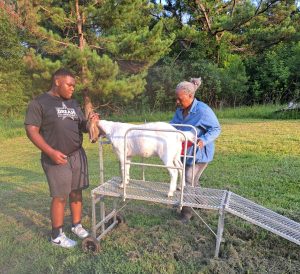 Brooks’ Family Farm is a 7-acre, multi-generational, family-owned and operated meat goat farm in Starkville, MS. Co-owner, Elmarie Brooks, is the only African American female goat farmer in the area. Brooks’ Family Farm uses minimal amounts of purchased feed and instead primarily pastures (allows to graze) their Nubian and Boer goats. They received a $5,000 grant to upgrade their barn facilities with essential equipment and supplies such as a livestock shearing and trimming stand, freestanding corrals, and a scale, as well as essential signage and supplies for group visits and farm tours. At this point they’ve purchased a number of supplies including a feeding tray, goat trimmers, a scale, a new gate for the entrance to the barn, and added signage. They experienced a lot of rain which has prevented placing new flooring material in the barn.
Brooks’ Family Farm is a 7-acre, multi-generational, family-owned and operated meat goat farm in Starkville, MS. Co-owner, Elmarie Brooks, is the only African American female goat farmer in the area. Brooks’ Family Farm uses minimal amounts of purchased feed and instead primarily pastures (allows to graze) their Nubian and Boer goats. They received a $5,000 grant to upgrade their barn facilities with essential equipment and supplies such as a livestock shearing and trimming stand, freestanding corrals, and a scale, as well as essential signage and supplies for group visits and farm tours. At this point they’ve purchased a number of supplies including a feeding tray, goat trimmers, a scale, a new gate for the entrance to the barn, and added signage. They experienced a lot of rain which has prevented placing new flooring material in the barn.
“We’ll be installing clay dirt covered by hay and installing pallets as stall dividers,” said farmer/owner Elmarie Brooks.
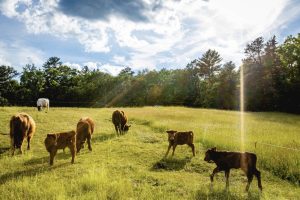 ContemPLATE is a 84-acre, non-profit farm based in Sterling, CT that provides access to farm-based therapies for veterans and first responders suffering from service-related disabilities such as PTSD as well as educational mentorship for at-risk youth in both Connecticut and Rhode Island. They received a $5,000 grant to improve their pollination program by purchasing five new colonies of honeybees and establishing an edible pollinator hedgerow filled with flowering plants, trees, and shrubs that will support pollinators year-round as well as provide crops.
ContemPLATE is a 84-acre, non-profit farm based in Sterling, CT that provides access to farm-based therapies for veterans and first responders suffering from service-related disabilities such as PTSD as well as educational mentorship for at-risk youth in both Connecticut and Rhode Island. They received a $5,000 grant to improve their pollination program by purchasing five new colonies of honeybees and establishing an edible pollinator hedgerow filled with flowering plants, trees, and shrubs that will support pollinators year-round as well as provide crops.
The’ve gotten their pollinator plantings in the ground and have purchased their new honeybee colonies. Their youth members are excited about the expanded pollination program.
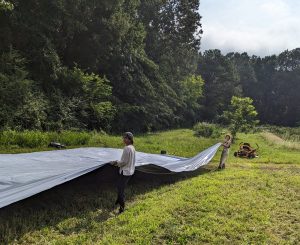 Crabtree Farms is a 22-acre community urban farm located in Chattanooga, TN that is committed to food access, education, and sustainable agriculture. The farm connects farmers with tools, resources, and people to build successful farm businesses. They received a $4,521 grant to expand no-till growing areas for both perennial and annual plants that will maximize the amount of food grown and available to community members and create new habitat for pollinators. They have done their initial field preparation and silage tarp application. Silage tarps help suppress weeds. They have also conducted a soil test to help determine their best cover crop options that will improve the health of their soil.
Crabtree Farms is a 22-acre community urban farm located in Chattanooga, TN that is committed to food access, education, and sustainable agriculture. The farm connects farmers with tools, resources, and people to build successful farm businesses. They received a $4,521 grant to expand no-till growing areas for both perennial and annual plants that will maximize the amount of food grown and available to community members and create new habitat for pollinators. They have done their initial field preparation and silage tarp application. Silage tarps help suppress weeds. They have also conducted a soil test to help determine their best cover crop options that will improve the health of their soil.
“Excitement for the new space by the community gardeners has been a positive outcome,” said Director of Development & Communications Lena Banks.
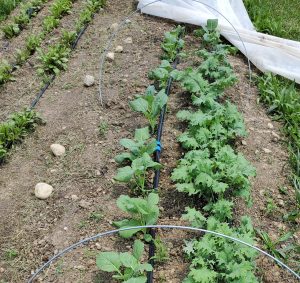 Endigo’s Herbals & Organics is a 1-acre, woman-of-color-run farm in Dayton, OH that uses regenerative practices to grow squash, tomatoes, greens (collards, mustard, kale), onions, peppers, okra, swiss chard, green beans, and cucumbers. Farm owner, Donnetta Boykin, sells her produce through direct sales, wholesalers, and through three farmer’s markets, in addition to donating to food pantries. They received a $5,000 grant to purchase equipment to transition growing areas to low/no-till and to add a cold storage unit to allow for proper storage of harvested crops.
Endigo’s Herbals & Organics is a 1-acre, woman-of-color-run farm in Dayton, OH that uses regenerative practices to grow squash, tomatoes, greens (collards, mustard, kale), onions, peppers, okra, swiss chard, green beans, and cucumbers. Farm owner, Donnetta Boykin, sells her produce through direct sales, wholesalers, and through three farmer’s markets, in addition to donating to food pantries. They received a $5,000 grant to purchase equipment to transition growing areas to low/no-till and to add a cold storage unit to allow for proper storage of harvested crops.
Owner Donnetta Boykin reported that after challenges sourcing the right size of cold storage unit that fit their budget, they were able to cut down on spoiled produce and participate in new wholesale opportunities. They are also using the cold storage to support a new seed saving/seed library project.
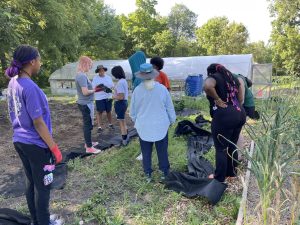 Global One Urban Farming is a 1.5-acre, non-profit farm in Kansas City, MO that produces and distributes free organic vegetables to seniors, veterans, and low-income families with the goal of raising health levels throughout Kansas City. Their team converts unused urban land into sustainable organic community vegetable gardens. They received a $3,100 grant to purchase an array of supplies and equipment including seeds, soil, mulch, and germination trays to expand their production an additional 10,000 square feet.
Global One Urban Farming is a 1.5-acre, non-profit farm in Kansas City, MO that produces and distributes free organic vegetables to seniors, veterans, and low-income families with the goal of raising health levels throughout Kansas City. Their team converts unused urban land into sustainable organic community vegetable gardens. They received a $3,100 grant to purchase an array of supplies and equipment including seeds, soil, mulch, and germination trays to expand their production an additional 10,000 square feet.
They are “now growing hundreds of heirloom plants to allow low-income food access. We just built a prairie garden with all native plants for more pollination.” said Farm Director Staroyce Nealy.
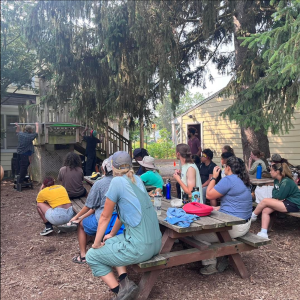 Growing Hope Urban Farm is a 2-acre, non-profit farm in Ypsilanti, MI that offers educational programs for gardeners of all ages and levels. Produce grown is sold at their farmer’s markets and donated to their program participants and local food pantries. They received a $3,782 grant to develop a new growing space and market garden with the purchase of caterpillar tunnels, seeds, a water cistern, harvesting bins, garden carts and more. So far, they have been able to build their new garden space, replace baseboards in the hoop house and bend pipes for the caterpillar tunnel.
Growing Hope Urban Farm is a 2-acre, non-profit farm in Ypsilanti, MI that offers educational programs for gardeners of all ages and levels. Produce grown is sold at their farmer’s markets and donated to their program participants and local food pantries. They received a $3,782 grant to develop a new growing space and market garden with the purchase of caterpillar tunnels, seeds, a water cistern, harvesting bins, garden carts and more. So far, they have been able to build their new garden space, replace baseboards in the hoop house and bend pipes for the caterpillar tunnel.
“We’ve also had half of our sliding scale CSA, ‘Solidarity Share,’ go to more than 25 families,” said Executive Director Julius Buzzard.
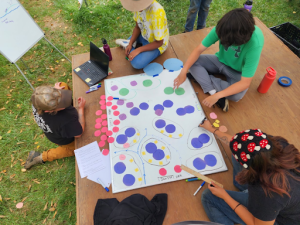 Garden-Raised Bounty (GRuB) is a 3-acre, non-profit farm in Olympia, WA that offers hands-on outdoor education and employment programming support for youth, ages 16-24, who have left high school before graduating. They are the only program of its kind in a five-county region. Food donations are their primary crop distribution. They received a $4,910 grant to expand their perennial berry production and improve weed management.
Garden-Raised Bounty (GRuB) is a 3-acre, non-profit farm in Olympia, WA that offers hands-on outdoor education and employment programming support for youth, ages 16-24, who have left high school before graduating. They are the only program of its kind in a five-county region. Food donations are their primary crop distribution. They received a $4,910 grant to expand their perennial berry production and improve weed management.
“We are currently working on the site prep and design with 20+ Opportunity Youth–youth experiencing barriers to success–who are involved in every step of the project as a vocational training opportunity,” said Clare Follmann. The team installed silage tarps earlier in the season to kill the cover crop and invasive weeds on the site and conducted an analysis of the soil to make sure its nutrient level will support berries. They purchased and received a commercial steamer to kill noxious weeds before composting them on site and expect to finish site prep in early September. The site will be fully planted with berries by October.
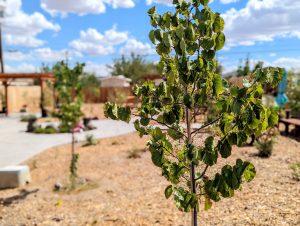 Holistic Divine Innovations is an agricultural non-profit that operates Ridgecrest Community Garden on less than an acre in Ridgecrest, CA. The garden is volunteer-run and provides fresh organic produce, education, and a space for healing and positive social engagement for many low-income families in a neighborhood that lacks easy access to healthy foods. They received a $3,672 grant to purchase and install a solar-powered automatic irrigation system to efficiently water up to 50 raised beds and several fruit trees. Their funds will also purchase fifteen flowering trees that will serve as wind-breaks that protect nearby plants and crops as well as increase biodiversity at the community garden site. They have exceeded their expectations and successfully purchased and planted 17 new flowering trees.
Holistic Divine Innovations is an agricultural non-profit that operates Ridgecrest Community Garden on less than an acre in Ridgecrest, CA. The garden is volunteer-run and provides fresh organic produce, education, and a space for healing and positive social engagement for many low-income families in a neighborhood that lacks easy access to healthy foods. They received a $3,672 grant to purchase and install a solar-powered automatic irrigation system to efficiently water up to 50 raised beds and several fruit trees. Their funds will also purchase fifteen flowering trees that will serve as wind-breaks that protect nearby plants and crops as well as increase biodiversity at the community garden site. They have exceeded their expectations and successfully purchased and planted 17 new flowering trees.
“We were able to plant new trees before the peak of the summer which allowed our trees to acclimate to our temperatures. Our watering system was installed just in time for summer to help us create a consistent watering schedule to help decrease our overall water usage by close to 50% during the months of June and July. We’ve planted a selection of trees that works well in our desert climate,” said President Tyrone Ledford.
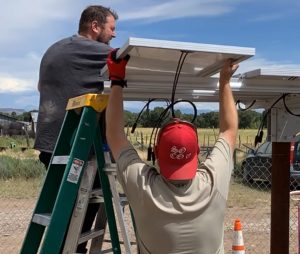 Jack Rabbit Hollow Farm is a 35-acre, off-grid organic farm and animal sanctuary in Antonito, CO that uses biodynamic and permaculture-based agriculture practices such as drought tolerant plantings that enhance biodiversity, cover cropping, and rotational grazing. They received a $4,980 grant to purchase and install a solar-powered water pump and drip irrigation system. This will replace their existing fossil fuel generator that operates their current well pump.
Jack Rabbit Hollow Farm is a 35-acre, off-grid organic farm and animal sanctuary in Antonito, CO that uses biodynamic and permaculture-based agriculture practices such as drought tolerant plantings that enhance biodiversity, cover cropping, and rotational grazing. They received a $4,980 grant to purchase and install a solar-powered water pump and drip irrigation system. This will replace their existing fossil fuel generator that operates their current well pump.
They have successfully installed the new solar pump system and brought the farm into using 100% renewable energy. “The sound of solar powered water is so sweet,” said Owner/Operator Morgan Velasquez. “Next step is running drip irrigation to feed the winter crops in the greenhouse. Our challenges so far have been timing the install of the well with our conservation greenhouse which will hold the first row of drip irrigation, future fruit trees, pollinator brooding and annual produce.
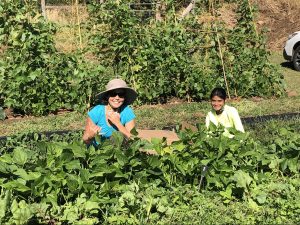 Kahua Pa’a Mua is a 2-acre agricultural nonprofit in Kapaau, HI. Their farming programs produce taro, red and green onion, long beans, kale, cabbage, eggplant, okra, tomatoes, spices, medicinal herbs, and cut flowers. In addition, they raise pigs, chickens, and rabbits for meat and eggs. They distribute food amongst vulnerable communities and food banks in the area. Kahua Pa’a Mua provides resources for families to grow their own food and nurtures agricultural entrepreneurship and primarily serves youth and adults of Hawaiian ancestry. They received a $5,000 grant to obtain necessary materials to construct a water catchment system. So far they expended their grant and obtained gutters, downspouts, and some transmission pipes into a holding tank.
Kahua Pa’a Mua is a 2-acre agricultural nonprofit in Kapaau, HI. Their farming programs produce taro, red and green onion, long beans, kale, cabbage, eggplant, okra, tomatoes, spices, medicinal herbs, and cut flowers. In addition, they raise pigs, chickens, and rabbits for meat and eggs. They distribute food amongst vulnerable communities and food banks in the area. Kahua Pa’a Mua provides resources for families to grow their own food and nurtures agricultural entrepreneurship and primarily serves youth and adults of Hawaiian ancestry. They received a $5,000 grant to obtain necessary materials to construct a water catchment system. So far they expended their grant and obtained gutters, downspouts, and some transmission pipes into a holding tank.
Once completed “all the water collected daily will be used to irrigate at least 1-2 acre field of crops. This will be accomplished by pumping the water from the holding tank to irrigation lines in the field,” said Project Manager Carol Fuertes.
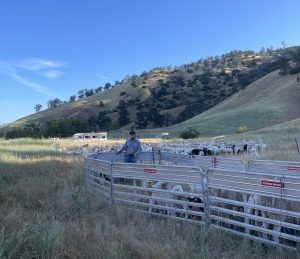 Perennial Grazing is a 70-acre farm and pasture in Rumsey, CA that grows table grapes and raises meat ducks and sheep, in addition to specializing in regenerative grazing services. They bring their sheep to graze farms, vineyards, and orchards throughout northern California to reduce wildfire fuel and naturally re-propagate native grasses and reduce invasive plant species, which also improves soil health without herbicides, tillage, or irrigation. They received a $4,750 grant to purchase a portable corral system to allow them to reach a greater number of clients in the northern California grasslands community.
Perennial Grazing is a 70-acre farm and pasture in Rumsey, CA that grows table grapes and raises meat ducks and sheep, in addition to specializing in regenerative grazing services. They bring their sheep to graze farms, vineyards, and orchards throughout northern California to reduce wildfire fuel and naturally re-propagate native grasses and reduce invasive plant species, which also improves soil health without herbicides, tillage, or irrigation. They received a $4,750 grant to purchase a portable corral system to allow them to reach a greater number of clients in the northern California grasslands community.
“The grant to purchase corrals has been a game-changer for our grazing business sustainability project. With the new corrals, we’ve significantly improved our sheep-moving efficiency and animal handling practices,” said Farm owner Shannon Waldron. The corrals also create a safe way for community members to witness sheep hauling. “The community can now gather and observe the sheep handling procedures, fostering a deeper understanding of our grazing practices. This interaction has also led to increased appreciation for sustainable land management and a stronger sense of connection between the community and our project. The corrals serve as a place for education and engagement, further reinforcing our commitment to transparency and community involvement in our grazing efforts.”
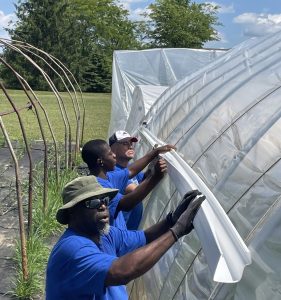 Prairie Hills Farm is a 7-acre farm in Selma, IN that grows around 20 different fruits and vegetables using organic practices, in addition to raising pasture-fed goats, chickens, and turkeys. Farmers Sylvester and Sabrina Friend have partnered with local schools, youth groups, and agricultural organizations to share their gardening and farming knowledge with the community. They received a $4,945 grant to extend their growing season by constructing hoop houses on their raised planting beds, reduce water waste by installing a drip irrigation system, and purchase gardening tools and supplies for a youth farming program.
Prairie Hills Farm is a 7-acre farm in Selma, IN that grows around 20 different fruits and vegetables using organic practices, in addition to raising pasture-fed goats, chickens, and turkeys. Farmers Sylvester and Sabrina Friend have partnered with local schools, youth groups, and agricultural organizations to share their gardening and farming knowledge with the community. They received a $4,945 grant to extend their growing season by constructing hoop houses on their raised planting beds, reduce water waste by installing a drip irrigation system, and purchase gardening tools and supplies for a youth farming program.
So far they have successfully completed a number of tasks associated with their project including installing irrigation lines and purchasing the equipment and storage containers to support the youth and school program.
“Since installing the irrigation system, we have reduced the amount of time to manually water the crops, by about 1.5 hours per day. Being a small farm with limited resources, the time recouped is extremely critical and value added,” said co-owner Sylvester Friend. They’re still working on getting the hoop house constructed for their growing beds.
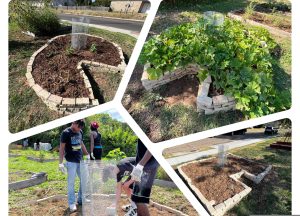 Sankofa Way Youth Garden is a 1-acre urban agricultural nonprofit in Waco, TX that connects the local community, especially youth, with the power of growing their own food. The farm produces crops such as okra, mixed herbs, tomatoes, peppers, sweet potatoes, bok choy, broccoli, onions, collards, peas, and melons. They received a $4,339 grant to nurture local youth through the planning, installation, planting, and harvesting of four keyhole gardens. Keyhole gardens are a sustainable farming system originally developed in Africa that allows for growing in small spaces. Each round garden has a walk-in notch for access and a compost pit in the center that nourishes the plants. So far Sankofa Way youth and staff successfully assembled the keyhole garden beds and planted them with pumpkins seeds for fall harvest.
Sankofa Way Youth Garden is a 1-acre urban agricultural nonprofit in Waco, TX that connects the local community, especially youth, with the power of growing their own food. The farm produces crops such as okra, mixed herbs, tomatoes, peppers, sweet potatoes, bok choy, broccoli, onions, collards, peas, and melons. They received a $4,339 grant to nurture local youth through the planning, installation, planting, and harvesting of four keyhole gardens. Keyhole gardens are a sustainable farming system originally developed in Africa that allows for growing in small spaces. Each round garden has a walk-in notch for access and a compost pit in the center that nourishes the plants. So far Sankofa Way youth and staff successfully assembled the keyhole garden beds and planted them with pumpkins seeds for fall harvest.
“For efficiency and space, we decided to take all the ordered materials and make three larger keyhole gardens instead of the planned four,” said Program Manager Chisa Brigham.
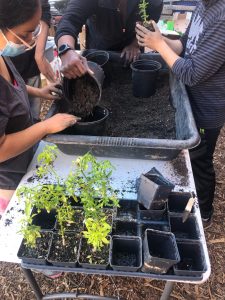 Sowing Seeds of Change is a 1-acre, nonprofit urban farm and community garden in Long Beach, CA that grows organic produce, employs transition-age people with disabilities and fosters youth (ages 18-22) through a job-readiness program. They also host free gardening workshops to the community. They received a $4,762 grant to build six more planter boxes, which will grow food for local residents; two ADA-compliant planter boxes to ensure that young adults with special mobility needs can access their training program; and purchase fruit trees and supplies to complete an expanded pollinator garden and tree hedge.
Sowing Seeds of Change is a 1-acre, nonprofit urban farm and community garden in Long Beach, CA that grows organic produce, employs transition-age people with disabilities and fosters youth (ages 18-22) through a job-readiness program. They also host free gardening workshops to the community. They received a $4,762 grant to build six more planter boxes, which will grow food for local residents; two ADA-compliant planter boxes to ensure that young adults with special mobility needs can access their training program; and purchase fruit trees and supplies to complete an expanded pollinator garden and tree hedge.
So far they’re noting pollinator activity and have planted some seedlings. They purchased and brought in the soil needed to fill the six new planter boxes. They’re looking forward to community volunteer events to help with the rest of the build.
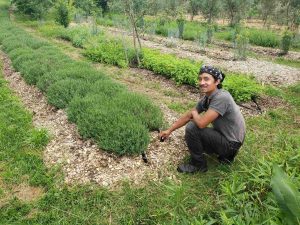 Unadilla Community Farm Education Center Inc. is an 11-acre, nonprofit farm and permaculture education center in West Edmeston, NY dedicated to providing education and training in sustainable agriculture and providing access to fresh produce for low-income and low-access communities. Their off-the-grid center grows 200+ varieties of annual and perennial cold-hardy fruits, vegetables, mushrooms, and herbs. They received a $5,000 grant to convert their existing solar-powered irrigation system from overhead sprinklers to drip irrigation.
Unadilla Community Farm Education Center Inc. is an 11-acre, nonprofit farm and permaculture education center in West Edmeston, NY dedicated to providing education and training in sustainable agriculture and providing access to fresh produce for low-income and low-access communities. Their off-the-grid center grows 200+ varieties of annual and perennial cold-hardy fruits, vegetables, mushrooms, and herbs. They received a $5,000 grant to convert their existing solar-powered irrigation system from overhead sprinklers to drip irrigation.
Unadilla Community Farm’s water-saving drip irrigation system was successfully installed by July 15, 2023 and is now in operation! All relevant work tasks were completed, from purchasing the components to installation, programming the timer valves, and monitoring the system.
“Positive outcomes of this project are already being measured, as the amount of staff hours spent managing the farm’s irrigation system has dropped dramatically — from an estimated 3 hours per day spent maneuvering the old overhead irrigation system, to 1 hour per week spent cleaning the filter, inspecting drip lines, and adjusting timer valves as needed,” said Board President Greta Zarro.
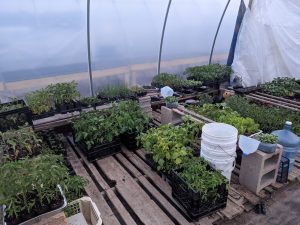 We Have Always Been Related (WHABR) is a 1-acre, non-profit farming collective in Milwaukee, WI. WHABR collective member, Chalchiuhkoatl Kardós, described the farm as, “an intentional intergenerational collective of two-spirit, queer, trans, nonbinary and gender expansive (2SQTNBGE) BIPOC earthworkers villaging up to take care of one another and reclaim, remember, and regenerate our traditional roles, responsibilities, knowledges, visions, and medicines within our communities.” Their work is rooted in regenerative practices such as restoring soil health and ancestral knowledge and wisdom to steward the land.They received a $4,999 grant to purchase a variety of supplies and equipment such as compost, a soil PH meter, straw, rice hulls, as well as provide seven low-income, 2SQTNBGE BIPOC families a full season’s share in their CSA program, which includes four farm visits and two community meals prepared by one of their member chefs with ingredients sourced from the farm.
We Have Always Been Related (WHABR) is a 1-acre, non-profit farming collective in Milwaukee, WI. WHABR collective member, Chalchiuhkoatl Kardós, described the farm as, “an intentional intergenerational collective of two-spirit, queer, trans, nonbinary and gender expansive (2SQTNBGE) BIPOC earthworkers villaging up to take care of one another and reclaim, remember, and regenerate our traditional roles, responsibilities, knowledges, visions, and medicines within our communities.” Their work is rooted in regenerative practices such as restoring soil health and ancestral knowledge and wisdom to steward the land.They received a $4,999 grant to purchase a variety of supplies and equipment such as compost, a soil PH meter, straw, rice hulls, as well as provide seven low-income, 2SQTNBGE BIPOC families a full season’s share in their CSA program, which includes four farm visits and two community meals prepared by one of their member chefs with ingredients sourced from the farm.
They are actively distributing CSA shares to families and have welcomed families to their growing spaces for two of the four visits.
“Families have supported us in building mounds, preparing seed beds, planting, “weeding,” mulching and watering,” said Chalchiuhkoatl Kardós.
Congratulations to our Grantees
These small farmers are actively working to better their communities and regenerate the planet. The FruitGuys Community Fund is honored to support our 2023 grantees’ efforts. Stay tuned for their end-of-the-year project updates and the start of our 2024 grant cycle, which opens in January. If you know a small farm or agricultural nonprofit, let them know about us! We’re excited to continue to assist those incredible small farmers making big impacts.
Please consider supporting the upcoming grant cycle and help make a big impact on a small farm. 100% of your donation goes to the farms. Donate today.




